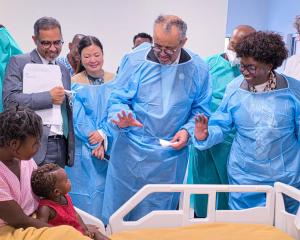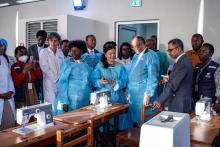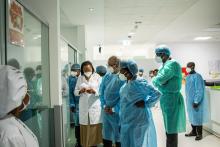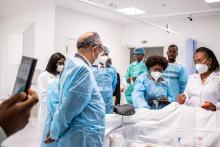WHO Director-General Witnesses Efforts to Restore Lives Affected by Fistula
To the soft and moving sound of the choir of hospitalised patients, the Director-General of the World Health Organisation, Dr Tedros Adhanom, walked through the fistula ward of the Azancot de Menezes Hospital, visibly moved by the reality that unfolded before him.
Each step reflected the intensity of the moment and the strength of the tireless efforts to treat and restore dignity to women who carry silent pain, victims of obstetric fistula, a condition that paradoxically arises from the most sublime act: giving birth.
Obstetric fistula is a devastating birth injury that affects millions of women worldwide, especially in developing countries. It occurs when a woman experiences prolonged and obstructed labour without access to timely medical care, resulting in the formation of an opening between the birth canal and the bladder or rectum. In some cases, it can also be caused by medical error, sexual abuse, or other traumatic injuries.
This condition causes chronic incontinence, social isolation, and stigma. In Angola, an estimated 20,000 women live with obstetric fistula; many of them are rejected by their partners and marginalised by their communities, condemned to a tragic fate.
However, there is hope. The Vangulula Centre at the Azancote de Menezes Maternity Hospital, which in the local Kimbundu language means ‘restoring life’, is a symbol of resilience and humanity. Created by the Vangulula Foundation, this centre not only provides treatment but also promotes rehabilitation, social reintegration, and prevention, ensuring quality care during childbirth and encouraging family planning, especially in rural areas.
Between 2014 and 2024, 3,195 women were treated, with a 98% success rate in simple cases. However, challenges remain: the lack of a dedicated operating theatre for fistulas, the scarcity of financial resources, and the shortage of professionals, among other factors, prolong the patients ' stay and limit the number of surgeries.
According to Dr Tedros, “treating women with fistula is an act of humanity that restores their dignity and hope. Ensuring support and solidarity is an immeasurable act that should unite governments, families, and health partners.”
Angola’s Minister of Health, Dr. Sílvia Lutucuta, reinforces this view by stating that “obstetric fistula remains a public health problem. Although it is a preventable and treatable condition, it remains associated with stigma and family abandonment, which reinforces the importance of interventions that promote autonomy and social inclusion after treatment for women.”
The prevention and treatment of fistula are not only medical issues, but also a commitment to the Sustainable Development Goals, equity, and human rights. Each woman treated represents a life restored, a story rewritten, and a future regained. For this to be possible, everyone's commitment is essential. Together, we can ensure that these women, who symbolise life itself and the continuity of humanity, regain their smiles and the right to dream again.



